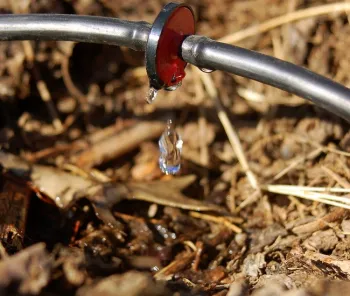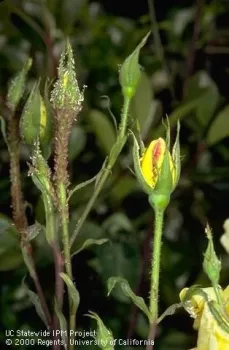Welcome to March! This is the time when your roses are starting to break out from dormancy. It is a good time for garden maintenance before the big flower display in April.
If you didn't do this last month, take some time and check your irrigation system to make sure it is working correctly. Make repairs if it is not. My garden is strictly on drip. Yes, I did go through every emitter to make sure it was an adequate size and working, and cleaned out the valves to make sure they were free from sediment. It is worth the time.

If your watering system isn't drip, run your sprinklers in the morning (only on days that we can water) before the day warms up. This will avoid moisture evaporating or collecting on leaves which can (during the warmer months) result in sunburn or (during the cooler months) make it favorable for fungal diseases to develop on your roses. If you have sprinklers, avoid watering in the evening or at night. This will prevent excessive ground moisture at night. Soil that is too wet can lead to unhappy roots and/or fungal diseases. Avoid watering when it is windy, so the water doesn't evaporate into the air instead of watering your roses.
If you are thinking you might want to use fungicide to prevent fungal diseases from happening, I would encourage you to wait and see if they develop. Only spray if you see fungal diseases or pests that can't be managed by any other means.
If you believe you must spray, no matter what, here are some dos and don'ts. Don't spray on a windy day. Don't spray during the late morning, afternoon or evening hours. Don't spray when bees are out (even organic sprays). Don't spray when it is over 80 degrees F as it can burn your plants. Don't spray on a rainy day or if it is going to rain the next day. Don't spray if your pets (or your neighbor's pets) are in the yard. Don't spray if your children/grandchildren/neighbors are in the yard. I cannot stress enough that spraying is serious. You must take precautions.
If you choose to spray, you can use a lime sulfur spray or a horticultural oil mixed with a dormant spray for fungal diseases. You need to wear an appropriate face mask (N95), gloves, closed-toe shoes (no sandals or slippers), and disposable coveralls or a safety suit. Yes, anytime you spray your roses for insects or diseases, it is serious business. You can hurt yourself or others if you don't. That includes organic sprays as well, such as neem oil, BT, etc. Just because something is labeled organic, doesn't mean it can't hurt you, your neighbors, pets, birds, bees, etc. Shower, including washing your hair, after spraying. Those chemicals (yes, even organic ones) need to be stored appropriately. Don't mix chemicals because you think that it will be better for the plants. Follow directions on the label. Leftover sprays and their containers need to be disposed of, appropriately. If all of this sounds like a lot of work, it is. There are alternatives!

I remove leaves that have powdery mildew, rust, etc., if I get it. New ones will grow in. Mostly, I don't get fungal diseases. That is because I try to choose disease-resistant varieties for my yard (and we generally have low humidity). I also practice shovel pruning. If the rose is a disease-ridden mess, out it goes. I grow roses for my own enjoyment and their beauty. I don't have time to baby them. Some roses do better than others in our climate. I want the ones that do well in my yard.
I clean up debris from my roses and place it in the green bin. It does not go in my compost pile. I also keep a good 3 to 4 inches of organic mulch around my roses to stop weeds in their tracks and keep my roses roots cool in summer and warm in winter. It also helps to keep my soil moist so I can water less. The mulch will eventually break down and help improve the soil in my yard. The soil in my yard left something to be desired when I first moved here. After several years, it has greatly improved due to using compost and mulch (not rubber mulch!) that eventually breaks down and improve the soil.
I attract the “good bugs” such as lady bird beetles, lacewings, etc., by planting pollinator plants in my garden. Flowering native plants such as yarrow (Achillea), California buckwheats (Eriogonum), seaside daisy (Erigeron), sticky monkey-flowers (Mimulus), tidy tips (Layia platyglossa), etc., attract the “good bugs” that will eat the “bad bugs.” Native plants are great choices. They are beautiful and they are drought tolerant. These plants also attract birds to my yard. They too will eat the “bad bugs” and they are quite amusing to watch.
If you have the space for new roses, there is still time to purchase them and get them into the ground or a large pot. I like ordering roses online from several different sources. I find a greater variety online and end up with terrific plants. Also, the people who work at these nurseries tend to know the plants they sell and can make useful recommendations about what will or won't work in my garden.
When the new growth on your roses is about 2 to 3 inches long, you can start fertilizing. I recommend a good organic rose fertilizer. It will contain micro elements that will help to improve your soil and your plant. Synthetic fertilizers do not. In reality, as I have written before, your plant doesn't care what you buy, organic or inorganic. However, organic fertilizers won't burn your plants or add salts to your soil (synthetic fertilizers are made of various salts — not the kind of salt you eat). Organic fertilizer will help to build your soil over time. As your soil improves, you will be able to use less fertilizer but have the same result.
When you apply fertilizer, make sure the soil is moist. Water before and after your application. You can also spray your roses with seaweed (kelp) fertilizer. Roses love it. It may smell for a day or two but I have smelled much worse when it comes to fertilizers.
Again, test your soil before you fertilize. Don't fertilize just to fertilize. You are wasting your hard-earned money (which you could be spending on plants!). More is not better! I have had great results with just compost and a good layer of organic mulch (not rubber mulch).
Next month…we should be seeing some beautiful spring blooms! If you can, take some time to enjoy all of the new and beautiful spring growth in your yard.
Until next time . . . "Friends are the roses of life. . . pick them carefully and avoid the thorns!" - Unknown


